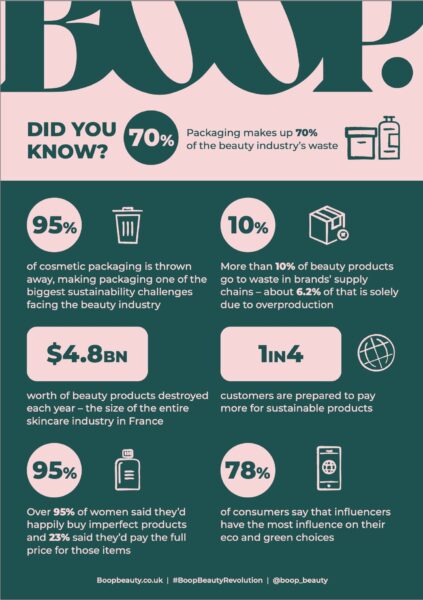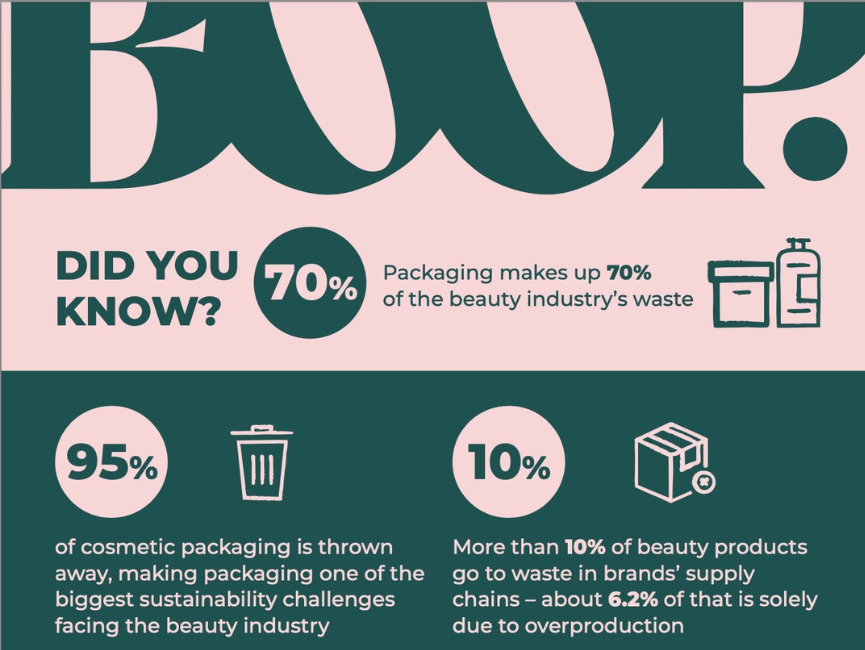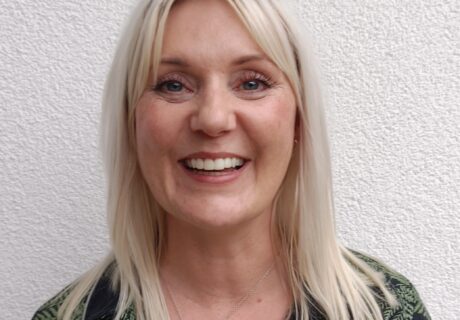In a concerted effort to combat the staggering problem of waste within the beauty industry, Boop, a new online outlet dedicated to rescuing ‘too-good-to-go’ beauty products, convened a panel of industry experts to delve into the root causes of the beauty industry’s waste problem.
The panel came together to address the industry’s pervasive waste issues, shedding light on the overlooked aspects of overproduction, packaging, and imperfect stock and looked ahead to explore emerging trends, shifting consumer mindsets and the Boop Beauty Revolution.
The panel, comprised of key figures including:
- Yasmine Amr, founder of Boop
- Bianca Foley, Founder and Editor of Sustainably Influenced
- Lisa Payne, Stylus Head of Beauty Trends
- Anna Priadka, Entrepreneur and beauty industry expert focused on sustainability. Founder of Planetpacks
- Michele Scott-Lynch, Founder of Bouclème
- Catarina De Avillez, Founder of The Natural Africa

“The beauty industry is grappling with waste problems; and our discussion really honed in on the areas of overproduction, packaging, and imperfect stock as the biggest culprits. Boop Beauty and similar companies are vital because they offer solutions to reduce this waste, aligning with shifting consumer demands for more sustainable practices.” Bianca Foley, Founder and Editor of Sustainably Influenced
The Key Challenges
A startling revelation emerged from their discussion: over 10% of beauty products are wasted within brands’ supply chains annually, amounting to a staggering $4.8 billion worth of products destroyed – equivalent to the entire skincare industry in France. Overproduction and poor stock management contribute significantly to this issue, exacerbated by ambitious stock forecasting and trends. Things like Christmas edition sets, or trend-driven packaging such as the Barbie pink limited edition sets that flooded the market in 2023 tend to have relatively short-lived customer appeal.
Packaging is one of the biggest sustainability challenges facing the industry, as it makes up 70% of the industry’s waste, with 95% of cosmetic packaging being thrown away. Consumers, increasingly conscious of their environmental footprint, are driving demand for sustainable packaging solutions. Anna Priadka suggested a variety of approaches, including mono-material packaging, bioplastics, and brand recycling schemes.
Imperfect stock, often overlooked, presents another facet of the waste problem, as premium and luxury brands want to uphold their brand value by making sure their products appear pristine. Products deemed imperfect due to minor packaging issues or returned by retailers are frequently discarded. Boop, however, offers a lifeline for these products, rescuing them from landfill and providing them with a second chance.
“As consumer knowledge around sustainability and greenwashing increases, it’s more important than ever for brands to consider how they manage their excess inventory and think about what they view as ‘waste’”
Emerging trends in sustainability and shifting consumer behaviour
The emergence of regenerative beauty signals a positive shift in the industry, with brands prioritizing not only sustainability but also positive impact. This means not just responsible ingredient sourcing and production processes but being restorative for the planet and creating a positive impact.
Consumer behavior is also evolving, with a growing willingness to pay more for sustainable products and embrace ‘imperfect’ items. “As consumer knowledge around sustainability and greenwashing increases, it’s more important than ever for brands to consider how they manage their excess inventory and think about what they view as ‘waste’” explains Yasmine Amr, founder of Boop. “But, as we see an uptick of consumer understanding on recyclability and ingredient traceability, I believe it’s an opportunity for brands to begin transparently and positively managing their stock. It’s not waste when it’s wanted. Over 95% of women said they’d happily buy imperfect products and 23% said they’d pay the full price for those items. With Boop, we’re showing that what’s traditionally considered ‘undesirable’ can be very much desirable.”
What’s Next?
Amid the rising tide of shifting consumer mindsets, the beauty industry needs to embrace the acceptance of ‘wonky’ products along with continuing to develop innovative packaging and regenerative beauty in order to prevent excess beauty products from ending up in landfill. Demanding transparency from brands will ensure there is more pressure for them to find a solution for their excess and imperfect stock.
To aid the beauty industry’s waste problem, Boop plans to expand its platform, amplifying the voices of forward-thinking consumers and advocating for the rescue of too-good-to-go products. By redirecting products to charities and fostering a community of sustainability-minded individuals, Boop aims to mitigate beauty waste and reshape industry norms.
With each rescued product, Boop takes a step towards a more environmentally conscious future, where beauty thrives without leaving a trail of waste behind.





